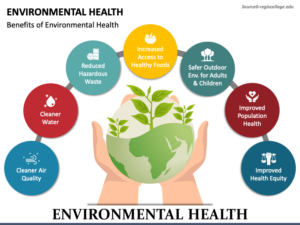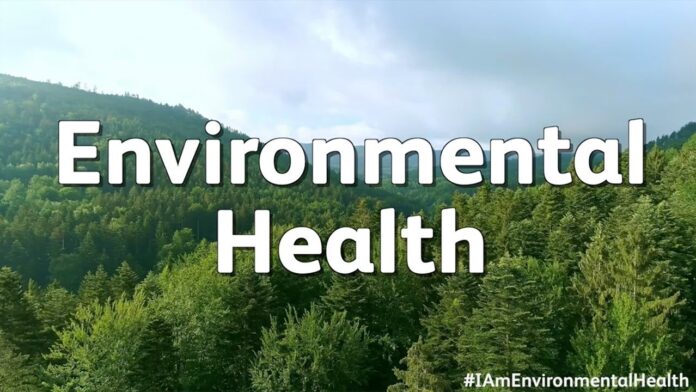Introduction:
The concerns of climate change, pollution, and resource depletion have made environmental health a top priority in today’s world. The wellbeing of all living things, including people, and the health of our planet are inextricably interwoven. This blog aims to draw attention to the importance of environmental health and illuminate doable methods we can help safeguard the earth for coming generations.
Defining Environmental Health
The area of public health known as environmental health focuses on how our environment affects human health and wellbeing. It includes different elements including exposure to harmful substances, soil quality, air quality, and water quality. Healthy ecosystems are a prerequisite for human life and sustained growth, and they are supported by healthy environments.
Climate Change and its Impacts
An urgent worldwide problem, climate change has negative effects on both the environment and human health. Widespread environmental damage is a result of rising temperatures, harsh weather, and altered rainfall patterns. Ecosystems may be damaged, food supply may be affected, the spread of infectious illnesses may be accelerated, and the frequency and severity of natural catastrophes may rise as a result of these changes. In order to mitigate climate change, it is important to adopt sustainable practises, reduce greenhouse gas emissions, and switch to renewable energy sources.
Air and Water Pollution
Environmental and human health are seriously threatened by air and water pollution. The air we breathe and the water we drink are contaminated by the discharge of pollutants from industrial activity, car emissions, and inappropriate waste disposal. Cardiovascular disorders, respiratory conditions, and a number of other health problems are caused by this pollution. Pollution can be reduced by promoting more eco-friendly production techniques, putting good waste management practises into practise, and using eco-friendly transportation systems.
Biodiversity and Ecosystem Conservation
The destruction of habitats and the loss of biodiversity are serious issues for environmental health. The natural resources that sustain life on Earth are provided by ecosystems in the form of clean air, clean water, and other critical services. Ecological equilibrium is thrown off by habitat fragmentation, overuse of natural resources, and deforestation. Maintaining a healthy environment depends on saving endangered species, recovering ecosystems, and supporting sustainable land-use practises.
Environmental Justice and Sustainability
All communities should have fair access to environmental health. In order to prevent marginalised communities from being disproportionately impacted by environmental risks, environmental justice places an emphasis on the equitable allocation of environmental costs and benefits. In order to satisfy current requirements, sustainable development must not jeopardise the ability of future generations to satisfy their own needs. The path to a healthier and more equitable future must include working towards sustainable practises, encouraging renewable energy, and supporting environmental regulations that put people and the world first.
The Role of Individual Actions
Environmental health is significantly promoted by individual actions. Each person has the power to change the world through little yet meaningful deeds. A few examples of energy conservation include turning off lights and appliances when not in use, consuming less water, recycling, composting, and using eco-friendly items. By incorporating sustainable practises into our daily lives, we can lessen our impact on the environment and encourage others to do the same.
Environmental Education and Awareness
Promoting environmental health relies heavily on environmental education. We can enable people to make wise judgements by increasing awareness of and educating them on the interconnectedness between human activity and the environment. On subjects like climate change, biodiversity conservation, and sustainable practises, instructional materials and workshops can be offered by schools, community organisations, and internet platforms. Increasing people’s awareness of environmental issues can instill a sense of responsibility in them and motivate them to take proactive measures to protect the environment.
Collaboration and Partnerships
The difficulties facing environmental health demand cross-sector cooperation. To come up with novel solutions, governments, non-profits, corporations, and people must collaborate. Implementing environmental protection-focused laws and regulations, assisting environmentally friendly enterprises and industries, and taking part in neighbourhood projects are all examples of collaborative endeavours. We can increase our effect and bring about significant change by encouraging partnerships and exchanging information and resources.
Sustainable Urban Planning
Sustainable urban planning is crucial to promoting environmental health given the expanding global population. Reduce pollution and enhance the quality of life for citizens by prioritising green spaces, effective public transportation networks, and sustainable infrastructure while designing cities. Reducing carbon emissions and promoting healthier lives can be achieved through establishing waste management plans, including renewable energy sources, and developing communities that are walkable and bikeable.
Long-Term Benefits for Future Generations
Maintaining environmental health is an investment in the future, not simply the here and now. We can build a sustainable environment for future generations by being proactive now. Future generations will have access to clean air, water, and a healthy planet by conserving resources, minimising pollution, and protecting ecosystems. A healthy environment is the cornerstone for sustainable growth and a higher standard of living for everybody, thus prioritising it also fosters social and economic well-being.
Conclusion:
A thorough approach is necessary since environmental health is a complex problem. We may improve the health of our world by applying sustainable practises, encouraging cooperation, incorporating individual efforts, and raising awareness. Let’s accept our duty to save the environment and provide a sustainable future for current generations as well. By working together, we can significantly contribute to creating a planet that is healthier and more resilient.
































